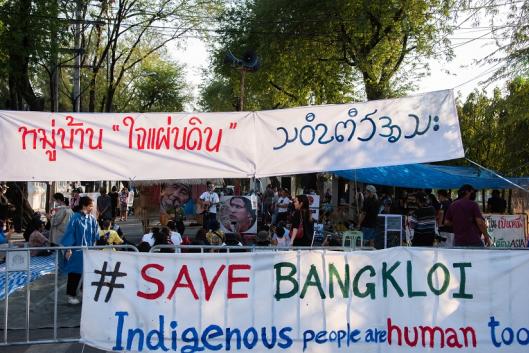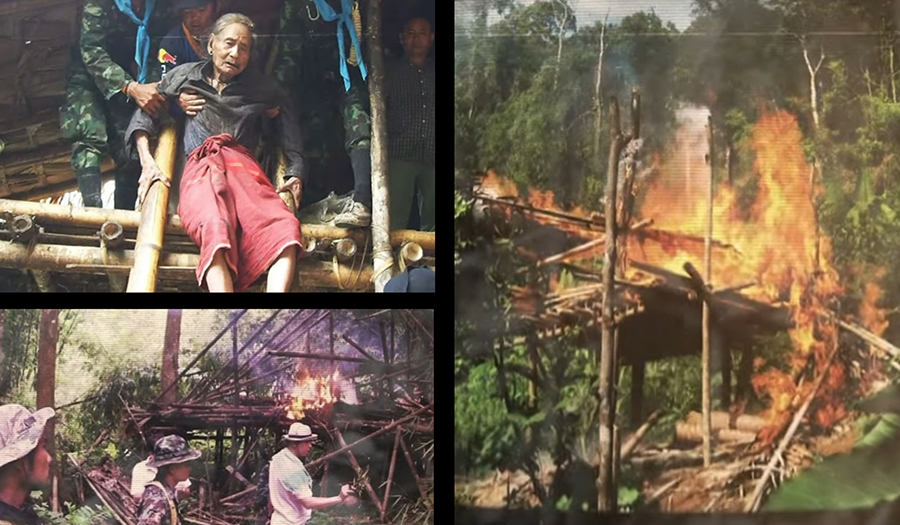UPDATE ON THE SITUATION OF THE KAREN INDIGENOUS COMMUNITIES FROM BANG KLOI, THAILAND
22 people have been prosecuted this year. They are forbidden from returning to Upper Bang Kloi or trespassing on the park without permission. They could face a jail term of 4 to 20 years. Human rights lawyers say that this is a strategic case against the rights of the Karen ethnic group in their original homeland.
In February this year, park officials found 36 Karen families in Upper Bang Kloi. Their refusal to leave led park officials to inform the police. Eighty three people were later removed from the forest.
Twenty-two people were arrested for encroaching the national park and later granted temporary release without bail. They are forbidden from returning to Upper Bang Kloi or trespassing on the park without permission. If guilty, they could face a jail term of 4 to 20 years or a fine between 400,000 Baht (US$12,742) and 2 million Baht, or both.
They have been prosecuted under the Forest Act, the National Reserve Forest Act and National Park Act. The case is under investigation to submit a lawsuit to the court. In addition, in an investigation into the date of arrest (March 5, 2021), officials collected DNA from villagers, preventing meetings with lawyers and the villagers were forced to confess.
A new generation of activists under the name of the #SaveBangKloi are taking a key role in public campaigns to stop the prosecution. Human rights lawyers say that this is a strategic case against the rights of the Karen ethnic group in their original homeland.
*** February, 2021
ALERT! Karen indigenous communities face danger after returning to their ancestral territory in Thailand
They have been living in the Kaeng Krachan forests, in Bang Kloi, for generations. When the Kaeng Krachan National Park was created in 1981, they started to suffer violence and evictions. Karen indigenous people from across the country, most of whom have faced similar discriminations and evictions, are mobilizing in solidarity to the communities from Bang Kloi’s right to return home.

In January 2021, Indigenous Karen people from Bang Kloi returned to their ancestral home in the Kaeng Krachan forests after years of dispossession and near-starvation.
They have suffered violence, discrimination, murders and evictions since the creation of the Kaeng Krachan National Park, in 1981:
- The Department of National Park, Wildlife, and Plant Conservation accuses them of being encroachers. Their rotational agriculture is vilified as a form of deforestation, even though this practice has kept the forest healthy for generations.
- In 1996, National Park officials relocated 57 families to Ban Pong Luek-Bang Kloi. After confronting failed promises and terrible conditions, many moved back to their ancestral territories.
- In 2011, the then Park chief, Chaiwat Kimlikitaksorn, led a team of armed soldiers and forest rangers to torch the Karen’s houses and rice barns. The forest dwellers fled in fear to the resettlement village.

- When the forest dweller’s advocate, Tatkamon Ob-om, exposed what happened in Bang Kloi, he was gunned down. The then Park chief was arrested but eventually freed because the gun could not be found.
- Porlajee "Billy" Rakchongcharoen, a young Karen land rights activist mysteriously disappeared in 2014. Five years later, in 2019, fragments of Billy's skull were found in an oil drum near the Park’s office. Chaiwat was not charged.
- Even though the Thai Supreme Administrative Court said Karen people’s land rights must be respected, violence increased.
- In 2019, a more violent National Park Law was passed. It makes Park officials more powerful than soldiers under an emergency decree. For example, officials can destroy forest people's homes by citing urgency, without the need to investigate anything.
- In August 2020, the Natural Resources and Environmental Conservation Strategic Taskforce’s Advisor visited the area and the villagers’ suffering was revealed: landlessness and an extremely difficult access to any livelihood. But there was no progress made after that.
- On 8 December 2020, the indigenous Karen submitted a letter to the Minister of Natural Resources and Environmental Conservation. There has been no answer.
In consequence, and after many attempts to restore their rights to return and live on their ancestral territory, on 9 January 2021, members of the Bang Kloi community returned to the Kaeng Krachan forests. But they are in extreme danger.
It is time for the Karen People from Bang Kloi be allowed to return and live in their territory without any threat or intimidation. They are not only fighting for a piece of forest on which to live. They are fighting for justice and dignity.